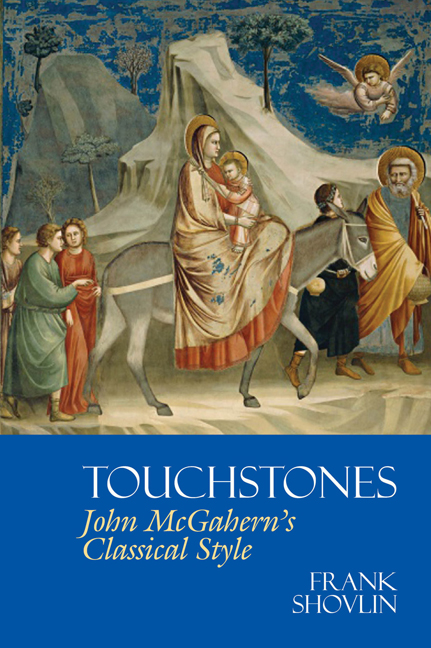Book contents
- Frontmatter
- Dedication
- Epigraph
- Contents
- Acknowledgements
- Touching Stones: Matthew Arnold and the Canon
- 1 We Other Clerks: James Joyce and the Classical Temper
- 2 A Walking Mirror: Stendhal, Horace, Nietzsche
- 3 One Lone Paperback: Tolstoy and Religious Sensibility
- 4 Magic: The Centrality of W. B. Yeats
- 5 Instinct: Douglas Stewart and Sex
- 6 The Fume of Muscatel: Yeats's Ghosts
- 7 Bohemian Rhapsody: Patrick Kavanagh and Generation X
- 8 Absurdity: Camus Comes to Clones
- 9 Aristocracy: Andrew Marvell, W. B. Yeats and the Curse of Cromwell
- 10 The Consolations of Nothingness: William Blake, W. B. Yeats and Prayer
- 11 Deliberate Happiness: W. B. Yeats and the Inner Life
- 12 Stranger in Paradise: Dante and Epic Style
- Conclusion: What Then?
- Bibliography
- Index
1 - We Other Clerks: James Joyce and the Classical Temper
from Touching Stones: Matthew Arnold and the Canon
- Frontmatter
- Dedication
- Epigraph
- Contents
- Acknowledgements
- Touching Stones: Matthew Arnold and the Canon
- 1 We Other Clerks: James Joyce and the Classical Temper
- 2 A Walking Mirror: Stendhal, Horace, Nietzsche
- 3 One Lone Paperback: Tolstoy and Religious Sensibility
- 4 Magic: The Centrality of W. B. Yeats
- 5 Instinct: Douglas Stewart and Sex
- 6 The Fume of Muscatel: Yeats's Ghosts
- 7 Bohemian Rhapsody: Patrick Kavanagh and Generation X
- 8 Absurdity: Camus Comes to Clones
- 9 Aristocracy: Andrew Marvell, W. B. Yeats and the Curse of Cromwell
- 10 The Consolations of Nothingness: William Blake, W. B. Yeats and Prayer
- 11 Deliberate Happiness: W. B. Yeats and the Inner Life
- 12 Stranger in Paradise: Dante and Epic Style
- Conclusion: What Then?
- Bibliography
- Index
Summary
The sordid details of his orgies stank under his very nostrils. The soot-coated packet of pictures which he had hidden in the flue of the fireplace and in the presence of whose shameless or bashful wantonness he lay for hours sinning in thought and deed; his monstrous dreams, peopled by ape-like creatures and by harlots with gleaming jewel eyes; the foul long letters he had written in the joy of guilty confession and carried secretly for days and days only to throw them under cover of night among the grass in the corner of a field or beneath some hingeless door in some niche in the hedges where a girl might come upon them as she walked by and read them secretly.
James Joyce, A Portrait of the Artist as a Young Man‘Joyce's temperament was essentially classical’, argues McGahern in his one published essay to look at Ireland's greatest fiction writer, an essay which quickly becomes not about Joyce at all but about Gustave Flaubert, a writer beloved equally of McGahern and of Joyce. What did McGahern mean by this? To prove his claim about Joyce's artistic tendencies, he turns to the composition of Dubliners and to the famous passage from Joyce's letter to the publisher Grant Richards in which he says that he has written the stories ‘in a style of scrupulous meanness’. But that does not really help us in defining classicism. What is useful is what McGahern has to say immediately after his long quote from the letter to Richards: ‘The authority and plain sense suggests that Joyce was well aware that he was working within a clearly defined tradition’.
Here McGahern can only mean a European tradition, rather than an Irish one, for he has already agreed in his opening paragraph of this essay with Joyce's brilliant, if ever jaundiced, brother Stanislaus who was scathing about the limitations of any Irish writing lineage. To live in Ireland, writes McGahern, ‘is to come into daily contact with a rampant individualism and localism dominating a vague, fragmented, often purely time-serving, national identity’. James Joyce would have agreed. ‘A nation which never advanced so far as a miracle-play’, he argued of his native country in one of his earliest essays, ‘affords no literary model to the artist’.
- Type
- Chapter
- Information
- Touchstones: John McGahern’s Classical Style , pp. 19 - 33Publisher: Liverpool University PressPrint publication year: 2016



